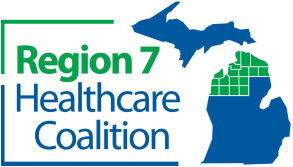|
Preparedness Lunch and Learn
January 16, 2024 The Preparedness Lunch and Learn series continues with Pediatric Readiness on January 16, 2024, with a discussion on Hospital Mass Fatality Planning. Throughout the series topics will continue to build knowledge for emergency managers in hospitals and other healthcare facilities as well as healthcare coalitions, local health departments, tribes and others. This series is the third Tuesday every month from 12 p.m. - 1 p.m. For registration, visit MI-TRAIN, course ID # 1112624 for the entire series. Click on the image for the full flyer! Preparedness Lunch and Learn Schedule December-March 2024 SNS to Host Monthly Informational Series on Preparedness Topics January 17, 2024 The Strategic National Stockpile (SNS) will host a series of monthly SNS Office Hours starting in January 2024. These one-hour national calls for state, local, tribal and territorial (SLTT) partners will focus on topic areas to assist SNS MCM planners and their partners with enhancing SNS preparedness programs. The first SNS Office Hours, scheduled for 4 p.m. to 5 p.m. EST on Wednesday, January 17, will focus on the SNS CHEMPACK program. During this session, CHEMPACK subject matter experts will provide the most recent program updates and answer participant questions. To ensure maximum benefit from this session, participants are strongly encouraged to submit questions to [email protected] (subject: SNS Office Hours: CHEMPACK) by Wednesday, January 10. Register here for the January SNS Office Hours. Michigan Volunteer Registry Administrator Training January 25, 2024 National Disaster Life Support (NDLS) Classes February 12, 2024 The first statewide NDLS course of 2024, Basic Disaster Life Support (BDLS) will be offered virtually February 12, 2024, from 5:00-9:00 p.m. Registration will open 30-days prior to the course. Please share this information with regional HCC partners. The following BDLS class will be April 5, 2024, starting at 8:00 a.m. and running until 12:00 p.m. For registration information or questions please contact Judy Wheeler at [email protected]). Annual Hazard Vulnerability Assessment Information As each coalition begins to work on the annual hazard vulnerability assessment (HVA) for their region, with a focus on healthcare, HPP would like to share some potential resources. The annual HVA is due into the CAT on June 30, 2024. Michigan Hazard Mitigation Plan Medical Surge Capacity Capability - Hazard Vulnerability Assessments for HCCs 2019 National Threat and Hazard Identification and Risk Assessment (THIRA) Methodology 2024 Michigan Communicable Disease Surveillance and Reporting Changes The updated 2024 Reportable Diseases in Michigan list is now available. This is Michigan's official list of mandatory reportable communicable disease conditions as described by the Michigan Communicable Disease Rules [Public Act 368 of 1978, 333.5111]. The Rules require MDHHS to annually review, update, and publish the list on the Department's website. The list is available in two formats:
For questions regarding reportable diseases, please contact the MDHHS Communicable Disease Division at 517-335-8165. 2024 Michigan Communicable Disease Surveillance and Reporting Changes ACMT & AACT Joint Position Statement: Nalmefene Should Not Replace Naloxone as the Primary Opioid Antidote at This Time Please see the attached joint statement regarding the newly FDA approved intranasal opioid overdose reversal medications, OPVEE and Indivior (both nalmefene) from the American College of Medical Toxicology and American Academy of Clinical Toxicology. The intent of the paper is to critically evaluate the recent approval of nalmefene as an opioid antagonist for overdose reversal, focusing on potential risks and the need for further research. To do so, a literature review and analysis of expert opinions from physicians, pharmacists, toxicologists, and poison information specialists was conducted. Concerns were identified regarding nalmefene's potential for causing prolonged and severe withdrawal symptoms due to its extended duration of action, compared to the established standard, naloxone. The purported efficacy of nalmefene against synthetic opioids lacked robust clinical evidence in real-world overdose settings. The limited data on its safety and effectiveness in actual overdose patients raised concerns about untoward consequences. Further, the anticipated need for prolonged hospital observation due to nalmefene's slower action profile could exacerbate resource limitations in healthcare systems. The authors concluded that “the potential benefits of nalmefene over naloxone (greater opioid receptor affinity, longer duration action) carry risk of causing harm. These benefits, if present, should be demonstrated in the clinical environment, balanced with the risks, and compared to naloxone prior to broad adoption of nalmefene.” ACMT & AACT Joint Position Statement: Nalmefene Should Not Replace Naloxone as the Primary Opioid Antidote at This Time FDA: Safely Using Hand Sanitizer If soap and water are not available, CDC recommends using alcohol-based hand sanitizers containing of at least 60% alcohol to help you avoid getting sick and spreading germs to others. Learn more about how to safely use hand sanitizer in a recently updated guide from the FDA.
0 Comments
Leave a Reply. |
Archives
April 2024
Categories |
To activate the Region 7
Medical Coordination Center call:
Gaylord Regional
Communication Center
1-989-732-5141
During your call, include the following information:
- Your name and contact number.
- Your agency or hospital.
- The reason for requesting the resource.
- Exact location to where you need the resource delivered.
- Who will accept and sign for the resource.
Medical Coordination Center call:
Gaylord Regional
Communication Center
1-989-732-5141
During your call, include the following information:
- Your name and contact number.
- Your agency or hospital.
- The reason for requesting the resource.
- Exact location to where you need the resource delivered.
- Who will accept and sign for the resource.
Site Map |
Organization |
Copyright © 2014 | 2464 Silver Fox Trail Suite A, Gaylord MI 49735 | 989.748.4975
|
 RSS Feed
RSS Feed
